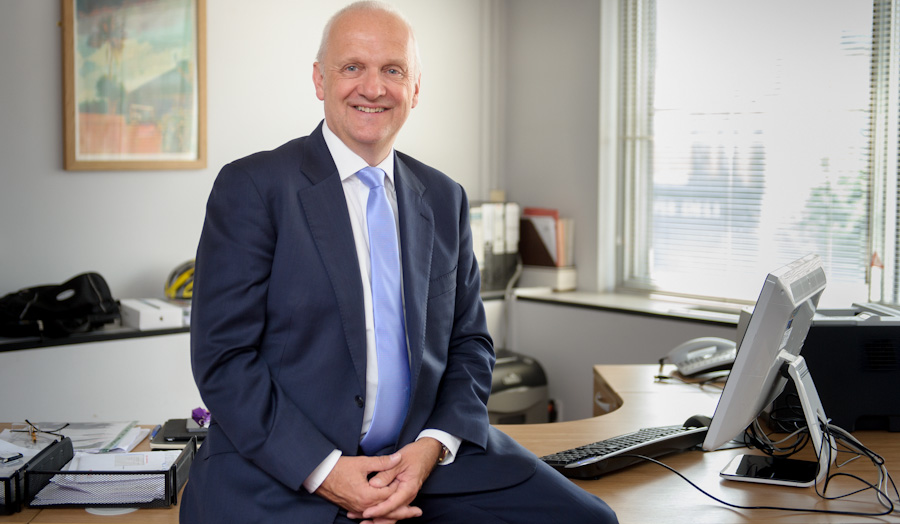We speak to the Vice Chancellor to review progress of our Strategic Plan 2015-2020.
Date: 24 August 2016
In his foreword to London Met’s Strategic Plan 2015-2020, Vice Chancellor Professor John Raftery articulated two key goals of the University’s strategy:
‘Underlying this Strategic Plan are two primary goals for the next planning period: to secure financial sustainability, and to coalesce around the common purpose of ensuring that London Met can improve the outcomes of its students.’
Since that Plan was published in July 2015, the University has launched a raft of projects to deliver on those two aims of financial sustainability and improved student outcomes.
Sustainability
Perhaps the most radical of those initiatives is the One Campus, One Community project, which will see the University consolidate in Islington in 2020.
“The Strategic Plan was quite clear that our size and shape as a University needed some serious thought, given our smaller student body, so we set out through the second half of 2015 to do just that,” said John.
“We looked at all of our options and managed to design a plan that generated over £125m to provide much-needed investment in the University and which has the advantage of bringing the University community together.
“Since the decision was made in October 2015 we have appointed a masterplanner; run wide ranging consultations and crits with students, staff and external stakeholders; created a compelling masterplan; and appointed architects to make it happen. We’ve also completed a comprehensive management review and designed a simpler, more logical structure for the whole University.
“The progress we have made in such a short time, in the face of some pretty nasty criticism at times, is truly impressive, and that is down to the determined efforts of the members of staff who have engaged in the process and who share our belief in what we are capable of at London Met, and in what we can achieve here together.”
Student outcomes
The One Campus, One Community project may be making good progress, but what about the other elements of the Strategic Plan, particularly those on student outcomes?
A number of schemes have been launched to directly address student outcomes. The Peer Assisted Student Success (PASS) scheme has benefited over 3,000 students so far. And the graduate internship scheme is entering its third intake and is providing superb opportunities for graduates.
The key driver of this work is the Programme for Improved Student Outcomes (PISO) which was launched as an outcome of the Strategic Plan. It includes a number of workstreams which are making good progress in the areas of student progression and retention and employment success.
The student led module feedback scheme was launched this year and aims to highlight and share excellent teaching practice, and improve teaching in real time where required. This is aimed at empowering students and giving them more control over their education.
Another aim was to increase the number of London Met academics with recognised teaching qualifications, such as Higher Education Fellowships. The initial target for this, as set out in the Plan, has already been smashed.
Results are coming in
Is any of this working? John believes so.
“We have this year seen a record student satisfaction score at London Met, with five courses securing 100% in the NSS. Our graduate employment score continues to rise, being the biggest two-year riser in the country. We’ve seen a massive 12% increase in graduate level employment within that data.
“We’ve also seen significant improvements in student retention, with drop outs reducing by 3% in year one, and attainment is also improving on last year.
“This isn’t ‘spin’ as some would have you believe – these are facts that staff and students need to know. We should celebrate success where we achieve it. We do have challenges, of course, but I feel confident that we can go into the new academic year optimistic and with a solid foundation of success to build on.”
The upcoming year will see more change, with the new structure and reporting lines settling into place in September, new locations for parts of The Cass and Guildhall, and the beginnings of estate development at Holloway. It’s also going to be a year of opportunity, with staff being actively encouraged to propose new courses to capitalise on shifting student and industry demand and contributing to revenue.
Course portfolio
The Plan states that one of the University’s priorities must be ‘to review and revise our academic portfolio, ensuring that programmes are viable both financially and in terms of quality.’ As a direct result of the Plan, courses with low demand or low student satisfaction scores have been closed, while a range of new courses have been created.
The Strategic Plan is, then, making a real impact and will continue to do so.
“I’d urge all colleagues, students and friends of London Met to revisit and re-read the Strategic Plan,” said John. “It is our guide for the period ahead and is proving to be a very effective one.
The Plan is working – the results are coming in. Change is happening at London Met and I want to thank all those who are helping to make it happen.
“We are going in the right direction. Outcomes for our students are improving, and if we maintain our commitment and hard work, the future gains will come.”

